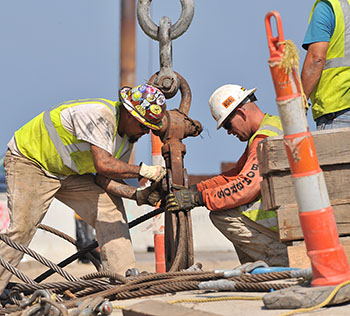 July 13, 2023—The newest ASME B30.5 standard for mobile cranes went into effect late last year and has new requirements for riggers. The two key differences in the new standard affect when a qualified rigger is required, and what constitutes a “qualified” rigger.
July 13, 2023—The newest ASME B30.5 standard for mobile cranes went into effect late last year and has new requirements for riggers. The two key differences in the new standard affect when a qualified rigger is required, and what constitutes a “qualified” rigger.
The current ASME B30.5 standard, which was released in 2021, requires at least one qualified rigger whenever a mobile crane is being used, regardless of industry. The standard further defined “qualified” as requiring evidence of satisfactorily passing both written and practical exams, such as those required for CCO Rigger Level I and CCO Rigger Level II certifications. One can thereby be assured that CCO certification exams cover the required subject areas, including:
- Selection and use of applicable hardware
- Applications of standard hitches
- Estimation of load weight, center of gravity, angle, and load movement
- Inspection of equipment
OSHA Requirements Differ from ASME
OSHA requires employers to use qualified riggers. OSHA gives specific guidance to include any hoisting activities relating to the assembly and disassembly or whenever there will be other workers inside the fall zone (the area directly under a load or the expanded area a load could fall into). Qualified riggers must also be used whenever workers will be guiding a load, hooking and unhooking a load, or connecting a load to a structure while it is still attached to the rig.
While ASME is explicit in the qualification requirements for the rigger, OSHA utilizes standard “qualification” language. Nationally accredited certifications such as what CCO offers are the only legally defensible and portable certifications that meet these standards.
CCO Certification Demonstrates Knowledge and Skills
As the gold standard of personnel certifications, CCO certification provides a proven, reliable, and defensible method to document the exams required by ASME and OSHA qualification requirements.
CCO’s Rigger Level I certification indicates that the certified rigger can perform simple, repetitive rigging tasks when the load weight, center of gravity, the rigging, and rigging configuration are provided or known by the rigger through experience or on-the-job training prior to the rigging activities. Specifically, Level I Riggers should be able to demonstrate or have knowledge of how to:
- Inspect rigging before use.
- Identify and attach rigging with basic knowledge of hitch configurations, capacities, and basic knots.
- Recognize associated hazards.
- Signal operations.
- Use various types of rigging equipment and basic hitches and their applications.
Riggers can demonstrate their higher level of knowledge and skill by achieving CCO Rigger Level II certification. In addition to Rigger Level I knowledge and skills, a CCO-certified Level II Rigger can select rigging components and procedures based on rigging capacity. A Level II Rigger can also perform the following rigging tasks unsupervised:
- Estimate load weight and center of gravity.
- Identify lift points.
- Determine and select rigging based on loading.
- Perform pre-use inspection of rigging and lift points.
- Identify and attach rigging with knowledge of hitch configurations and load angle factors, rigging capacities, and load integrity.
- Understand load dynamics and associated hazards.
As applicable, CCO-certified Level II Riggers also have a working knowledge of hoisting equipment, winches, jacks, industrial rollers, and similar equipment.
Why Certify Rather than Just Qualify?
Multiple studies have demonstrated that certification creates safer worksites when compared to qualification. At the core of this is the rigor that nationally accredited certification bodies review, analyze, and update their exam questions. Additionally, nationally accredited certification bodies keep their exams extremely confidential and have based their exams on a comprehensive job task analysis. These steps make these exams amongst the most stringent, reliable, and defensible exams in the nation.
For the rigger, certification through a nationally accredited certification body means that you have met the “gold-standard” and your certification follows you. You are a part of an elite group of professionals that have taken your craft to the next level.
For more information about CCO Rigger certifications, go to www.nccco.org/RIG.